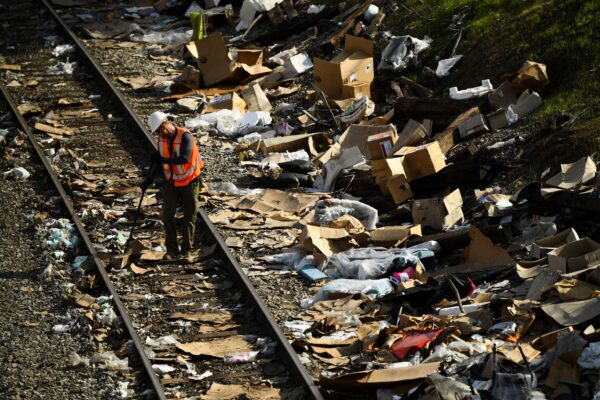Instead of making train robbers think twice by threatening jail time, has made Union Pacific reconsider sending its goods through the area, a letter from the company states.
Union Pacific (UP), the nation’s largest rail freight company, sent a letter to Los Angeles District Attorney George Gascon stating that train robberies in his jurisdiction have increased by 356 percent from October 2020 to October 2021.
Robbery losses are so high that the company is considering ceasing traffic through the county.
FedEx and UPS are also trying to divert railroad shipping away from the area, the letter stated.
“We do not take this effort lightly, particularly during the supply chain crisis, as this drastic change to our operations will create significant impacts and strains throughout the local, state, and national supply chain systems,” the letter reads.
But slower shipping still beats shipping that gets stolen.
On train tracks in Los Angeles, a carpet of ripped-open packages and plastic stretches as far as the eye can see. At one point, packages on the tracks piled up so much that a train derailed.
One reporter on scene estimated that one in every five train cars was torn open and looted.
In its letter, UP said in the past three months, thieves broke into 90 train containers every day. Often, thieves carried weapons and assaulted train employers.
Thieves have taken a grand total of $5 million from the railroad, the letter said.
In response, UP has deployed drones, fencing, high-tech trespasser detection systems, and has paid for additional law enforcement help to prevent theft.
The results have been underwhelming, but not because UP failed to catch criminals.

“Even with these expanded resources and closer partnerships with local law enforcement, we find ourselves coming back to the same results with the Los Angeles County criminal justice system,” the letter reads.
According to UP, the local district attorney’s office lets the criminals it captures walk free.
“Without any judicial deterrence or consequence, it is no surprise that over the past year UP has witnessed the significant increase in criminal rail theft described above,” the letter reads.
After more than 100 arrests of train-robbers, UP said that it has not been contacted once for court proceedings. Many of these arrests were made by UP’s own hired security.
Instead of charging thieves with felonies, the district attorney’s office sent them to local courts, reduced their charges to misdemeanors or petty offenses, then released them after they paid a small fine, UP said. The whole process takes about one day.
“Criminals boast to our officers that charges will be pled down to simple trespassing–which bears no serious consequence,” the letter reads.
UP suggested that the lenient sentences were motivated by social justice.
“While we understand the well-intended social justice goals of the policy, we need our justice system to support our partnership efforts with local law enforcement, hold these criminals accountable, and most important, help protect our employees and the critical local and national rail network,” the letter read.
Los Angeles County’s decision to let tracks become too dangerous for trains will have nationwide consequences. Los Angeles County is one of America’s most important transportation hubs.
The county has both of America’s two largest ports, the Port of Los Angeles and the Port of Long Beach, which together receive more than nine million containers yearly.
At the Port of Los Angeles, freight trains carry about a third of this never-ending river of containers to their eventual destinations across America.
For now, UP runs three of the port’s five main railyards.
The Port of Long Beach also depends on UP for railroad shipping.
Without Union Pacific, ports will have to find a new way to export containers.
UP told the district attorney it would “strongly urge” him to reconsider his policies.
“We stand ready to meet with you and other stakeholders to help implement needed and immediate actions. We look forward to that necessary collaboration to restore public safety and order,” the letter ended.
From The Epoch Times

